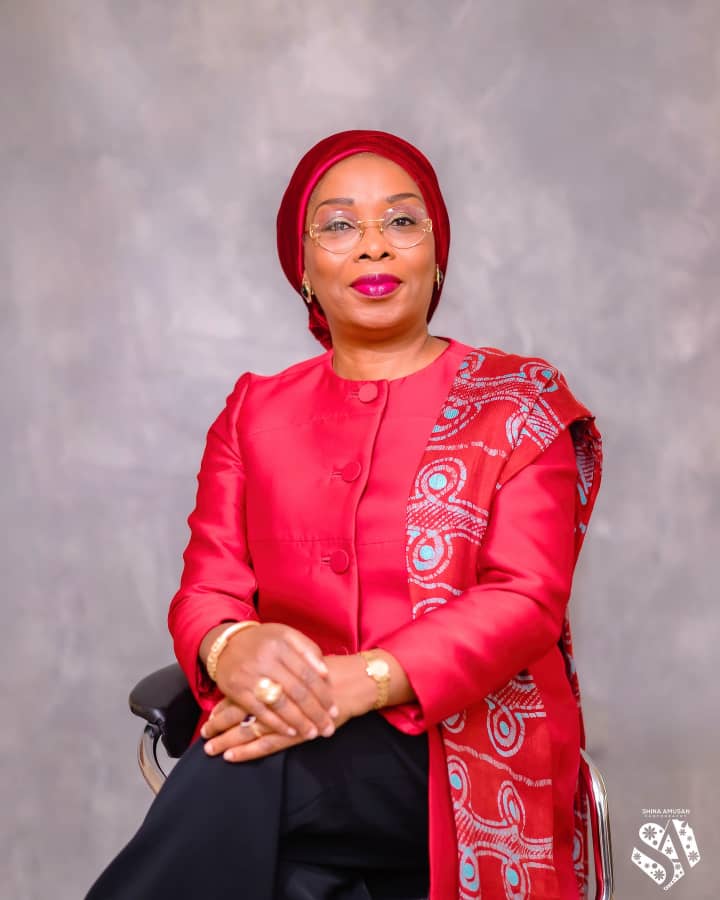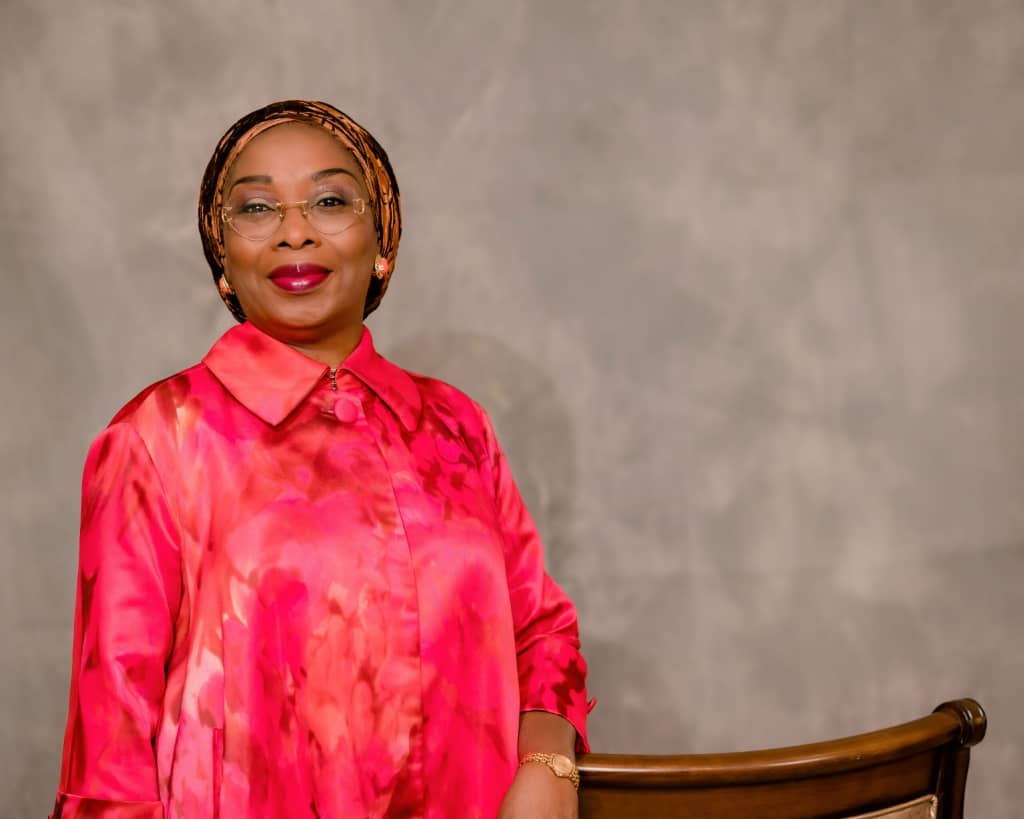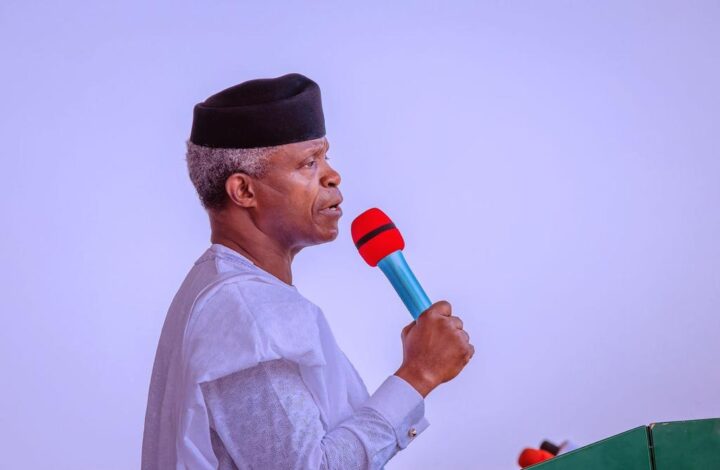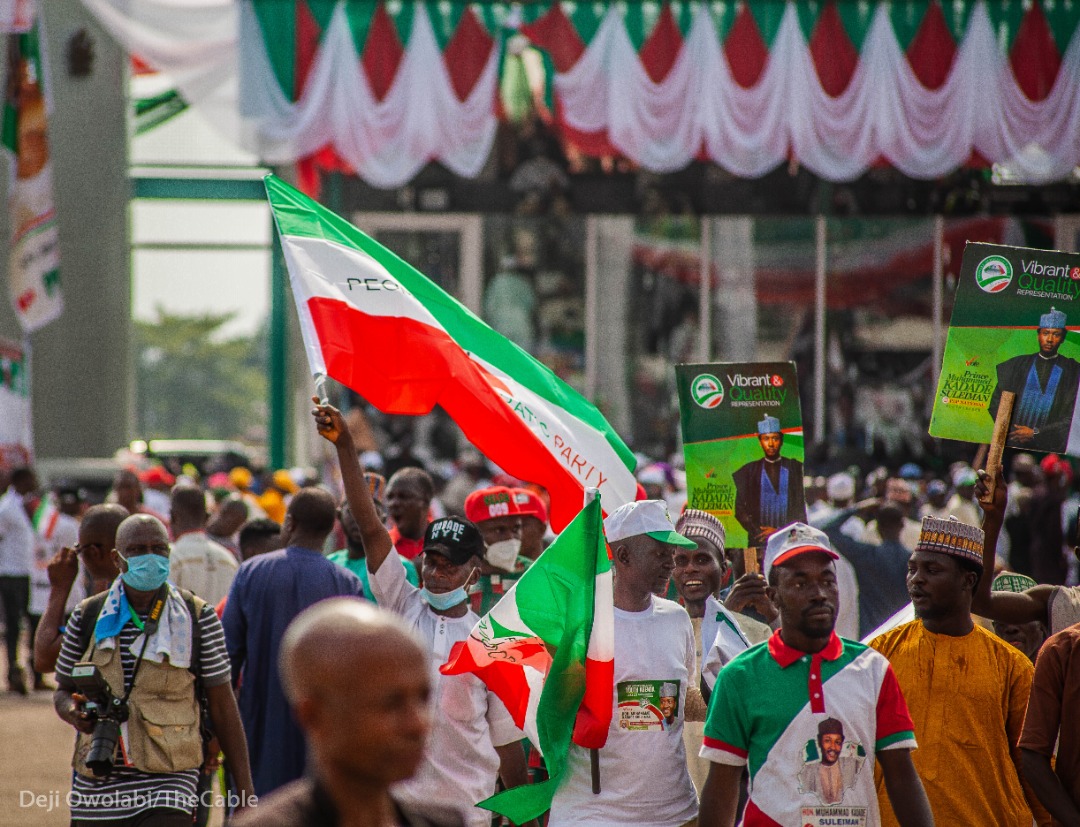On March 2, Modele Sarafa-Yusuf, award-winning journalist and former special adviser to Dapo Abiodun, governor of Ogun, declared her intention to contest the Ogun governorship election. A seasoned sportscaster, Sarafa-Yusuf is the first aspirant on the platform of the All Progressives Congress (APC) to announce her ambition to become Ogun governor. In this interview with TheCable’s EBUNOLUWA OLAFUSI, Sarafa-Yusuf, who believes gender should not limit interest in public office, said she has what it takes to bring positive transformation to Ogun.
TheCable: What have the reactions been like since you declared to run for governor?
Sarafa-Yusuf: I have been completely overwhelmed by the positive reaction of our people — party leaders, members and the people we want to serve. It’s been very heartwarming. Many people have owned our campaign and are carrying the banner on our behalf. They are offering us advice, support and offering to work with us to make this happen. We know we have the primary hurdle to cross and already, people are volunteering to keep an eye on the process so that the Anambra APC primary scenario will not happen in Ogun; so that people will not just ‘write results’.
Already, we have a strong pool of volunteers and the real electioneering has not even started. We are very encouraged. Of course, there have been a few people who have questioned this move but they didn’t say I am not qualified to run. The only thing they say is what if the governor wants a second term; but these people are very few. So, we are highly encouraged to keep going.
Advertisement
TheCable: What is the main driver of your ambition?
Sarafa-Yusuf: Ogun is destined to be a dynamic and globally competitive state but it has, sadly, been plagued by an apparent inefficient allocation of resources. I realised that what has stopped us from meeting the challenges of our state is not the absence of sound policies and sensible plans but deficiency of leadership and the smallness of our politics. At our stage of development, politics should be about programmes. How do we lift our people out of poverty? How do we partner with youths who constitute more than 60 percent of our population to achieve the tomorrow of their dreams? We clearly still have a long way to go in maximising the potential of our people and there’s an urgent need to tackle poverty. I am very emotional about this because poverty not only impacts the present, it impairs the future. Poverty is such a powerful constraint on capitalisation that it can reduce a child to a lifetime of mediocrity.
So, for democracy to be meaningful, it has to address the needs of the people. As Sudanese British billionaire, Mo Ibrahim, once pointed out, “We cannot eat democracy. It is important to create jobs, to improve education and health, and economic development. People need to have clean water. People need to have access to power and energy.” I also believe that we need to pay attention to our young people and listen to them. We need to create jobs. We need to improve education. We need to develop skills. We need more technical schools because that is education for employment. For a few years now, people, especially young people, have looked on in disappointment and frustration as their hopes for new dawn have been dashed. The desired change for a better and prosperous state can only happen if citizens’ participation in democratic and political institutions is expanded. I believe it can only happen when the best candidates are put forward ab initio. My vision is to be a transformative and inclusive leader and to make Ogun the state of choice for people to live, work and play because of the educational, economic, and cultural opportunities; safety, livability, vibrancy, and connectedness.
Advertisement
Secondly, our party, the APC, in Ogun state needs a candidate that can win in the next elections. When you have an unpopular or divisive candidate, the party’s chances of victory are greatly diminished. What I bring to the table are what I call my five Cs — competence, caring, conciliatoriness, compelling vision and character — which include financial, moral and relational integrity. I believe I can win Ogun state for our party and go on to do well for our people.
TheCable: What signs have you seen to believe that Ogun is ready for its first female governor?

Sarafa-Yusuf: I know they say politicians are incurable optimists but like I said, I believe strongly that we can win and retain Ogun state as a progressive state. Before we made this declaration, we did a survey — a poll — and among other things, we asked the people if they would vote for a capable woman as governor. Sixty-six percent of the respondents said they would — unconditionally; 20 percent said they could vote for a woman, depending on who the woman is. Only 14 percent said they would not vote for a female candidate and some of the reasons they gave include the fact that a woman might not have the money to run for office or the strength to undertake the rigours of electioneering campaigns. So, if about 80 percent of respondents said they would vote for a capable woman as governor, we knew we were on to a good thing.
Advertisement
Let’s be clear though; I am not running just because I am a woman and there has never been an elected woman governor in our country, even though that’s a good enough reason to run.
I am running because I understand the issues. I am running because I want life to be better for the majority of our people. I am running because I am capable. In every job I have held, I have excelled and my track records in public life speak for themselves. I have an innate ability to dream big, challenge assumptions, and inspire teams. I know how to translate big ideas into concrete action and results.
It’s important for our people to know that gender shouldn’t be a factor in whether or not a person can be a great leader. A person’s leadership abilities depend on their individual strengths and personality traits. However, in many cases, women aren’t encouraged to take on leadership roles — which is a major contributing factor to the imbalance of who’s in power. Women make great leaders. We know how to work across party lines; we are highly responsive to constituent concerns; we encourage citizen confidence in democracy through our own participation and we prioritise health, education, infrastructure, and other key development indicators — not highfalutin vanity projects.
Another reason women make great leaders is that the odds are against us to lead. When you’re the underdog, it takes an extra push to get to the top. And as someone said, that’s why women who emerge on top are extraordinarily strong and capable. We had to fight to get there.
Advertisement
For me, I have never been intimidated by challenges. All my professional life, I have often been the only woman in the room and I work hard to hold my own space. I get along very well with men and women and I look forward to being given the opportunity to serve the people of Ogun state and to prove that a woman can be a fantastic governor.
TheCable: Do you think you have the support of the womenfolk?
Advertisement

Sarafa-Yusuf: Ogun women are bucking the trend. They have been fantastic so far! They have owned our candidature and many women groups have adopted us. I have also met many women — highly placed in society — who have taken more than a passing interest in this matter. And when I say that, trust me, I am understating it! I believe that narrative of women not supporting women belongs to the past. But of course, you cannot rule out the few women who may be benefitting from the status quo — they will be antagonistic. But they are in the minority of minorities if there’s any such term!
Advertisement
That said, it’s not only women who are supporting us. We have a robust base of support and once we win the primary by the grace of God, we will come out in full force and you will see the result of our hard work. And more importantly, there is the grace of God which we have continued to enjoy.
TheCable: Do you think the time you’ve spent in the political sphere may affect your ambition?
Advertisement
Sarafa-Yusuf: First, I have been involved in politics for longer than three years — albeit not as active as I have been in the last four years. But I agree that I haven’t spent as much time as some others have done actively playing the politics of Ogun state. So, I know there is a certain audacity to this declaration. I’ve however been here long enough to know that things must change. And I’ve been here long enough to know the things we need to do to bring about that change. Also, I recognise that there is a certain daring to this declaration, because I know we don’t have plenty of money but as I always say, we have something that money cannot buy — we have a lot of goodwill. We enjoy a lot of endorsements. We have consulted far and wide — within the party and among our people and it’s more positive than negative.
As I said in my declaration speech, I may not seem the most probable candidate for this office because, after all, we’ve had 15 governors since the state was created in 1976 and all of them have been men. But the time is right and we pray that we continue to enjoy God’s grace. While women have played critical roles in our history, they are not nearly enough. I, like so many people, believe that we need more women at the top table. One of the reasons I believe political participation for women should be a priority, is that it is not only a goal in itself but also an enabler for gender equality. We want to inspire younger women to aspire to political positions. It’s time to break the jinx.
A handful of people have talked about the experience in governance and I say to them: There’s no school where you go and learn how to be governor. That said, I have a master’s degree in public administration. Public administration studies the implementation of government policies and prepares people for work in the public service. It draws heavily on the fields of political science and administrative law. Specifically, it is the planning, organising, directing, coordinating, and controlling of government operations. Beyond that, at a certain point, it’s your ability to learn quickly and contribute quickly that matters — that’s one of the most important qualities a leader must have.
All over the world, there have been high-flying politicians with different backgrounds — lawyers, doctors, architects, sportspeople, actors, business people — and the only common thread is that they first excelled in their profession or calling.
I am a journalist, a broadcaster, a marketing communications expert, and an entrepreneur. People’s judgment is that I have done very well in everything I have done. I’ve also won many awards over the years which seem to corroborate those views. Journalism is where I made my name and it’s interesting because some of our best politicians in these parts have been journalists — Baba Awolowo who was also a great lawyer, chief Anthony Enahoro who moved the motion for Nigeria’s independence, alhaji Lateef Jakande, who is unarguably one of the best governors of Lagos state, and in Ogun state, late elder statesman chief Olabisi Onabanjo and our papa and leader, chief Olusegun Osoba who continues to be a shining light in Ogun politics. All of them are accomplished journalists who I consider role models. I am ready and I believe Ogun state is ready. We have always been pacesetters in Ogun.
TheCable: As former special adviser to the current administration, will you step down for the incumbent governor if he decides to seek re-election?
Sarafa-Yusuf: We will cross that bridge if and when we get there. For now, he hasn’t said he will run for second term. I also wonder why people think that a second term is a ‘given’. If it was, the constitution would give an eight-year term — but it doesn’t. The constitution says a governor should spend four years, give an account of his stewardship and then come out to test his popularity and get a possible four more years. Governor Abiodun may yet support a good candidate and I don’t see why he wouldn’t support me if that’s the case. He knows my capabilities and my love for the state. I also supported him when he ran, so I am hopeful that he would return the favour — as a gentleman should.
TheCable: With increasing reports of kidnapping and ritual killings in Ogun, how do you intend to tackle this?
Sarafa-Yusuf: The orgy of violence in Ogun state in recent times leaves me heartbroken and worried for the future. Ogun state’s strength is in location, land, natural resources and human resources. For a state so blessed, what we witness in cult and gang-related activities, ritual killings, etc., is totally unacceptable.
Security of lives and property is the number one duty of a responsible government and we must do more to keep the citizenry safe and the state secure in order to retain the current investment levels and attract more. It was a 19th-century American social worker who said “of all the aspects of social misery, nothing is so heartbreaking as unemployment.”
In most societies, criminal offending and victimisation are disproportionately concentrated among individuals with low socio-economic status living in economically disadvantaged areas. In Ogun state, the youth comprises about 70% of the population with the majority being underemployed and unemployed.
By the way, the young are three times more likely than adults to be unemployed. A growing subset of these young people is what we call the NEET (not in education, employment or training) group. These ones are stalled and hard to reach. They remain at particular risk of both social and labour market exclusion and are, therefore, prone to criminality. In fact, some people have likened the youth crisis to a time bomb waiting to explode or beginning to explode.
Because mass unemployment and underemployment exacerbate inequalities and fuel a sense of resentment, unemployed and underemployed people are often more at risk of depression, anxiety and stress. These occasionally lead to violence and it is my view that tackling unemployment and underemployment is the first step to keeping us all safe.
Apart from internal security which will seek to fight the menace of organised crimes, our security policy will therefore encompass addressing socio-economic inequalities, and the geographic disparities between developed and under-developed areas of the state. The security plan would provide for pursuing youth-focused policies since the idle hand is the devil’s workshop. We would also work on guaranteeing food security, improving preventive healthcare, and mainstreaming environmental protection.
That said, I also know that some who would be criminals would be criminals regardless of other opportunities and so, some of our plans to tackle insecurity would include building smart cities to ensure high levels of surveillance and well-coordinated responses, motivating and incentivising the law enforcement agencies, further encouraging collaboration between government and the private sector to ensure the funding and effective management of the Ogun state security trust fund. We will ensure all the police divisions and area commands have the required logistics including operational vehicles and communication equipment to discharge their duties. There will be training and equipping the Amotekun corps to complement police efforts.
Human capital development, such as education and training, is a critical policy lever to prevent the adverse effects of job displacement on the economic, social, and psychological well-being of individuals. With this in mind, we will put in place support services in the form of assistance in the short run and human capital development in the long run. An important policy lever in this regard is education and training. We also have to lead by example. A morally deficient leader cannot command the respect of the people or tell them to walk the straight and narrow path. They would ask: ‘what are your words worth?’





